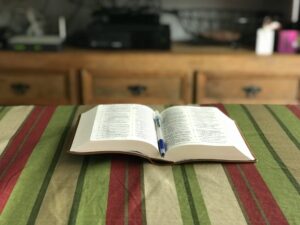Every pastor knows the value of a good question. When visiting with someone in your care, it can be your questions that move the conversation in a helpful direction.
“So how are things at home?” What have you been reading in your devotions?” “Any plans for next year?” “What’s been giving you joy this last while?”
Questions excavate the layers. Questions uncover what has been hidden. A pastoral visit should be the furthest thing from an interrogation, but a pastor (or an elder) wants to know his people so that he can help. Good questions answered honestly can prompt more questions, leading to a conversation that encourages and refines.
But sometimes a pastor hesitates. The visit has been bumping along—topics broached and cursorily discussed, questions asked and sort of answered—and the pastor is uneasy. He has the feeling that he hasn’t been able to get to the heart. He needs to cut deeper and sharper. In his mind, he’s forming a question that he’d like to ask, one to slice through some of the conversation’s niceties and generalities.
But he hesitates. For he is fearful. What will the hard question uncover?
“Why do you seem kind of angry today?” “How’s it going with sexual temptation?” “Are things good between you and your wife?”
These aren’t well-worded questions. In the moment, the pastor will need to do better, probably preface it more carefully, and give less room for a binary answer. But the pastor knows that he needs to ask something harder. Call it a gut feeling—not quite the tingling of spidey-sense, more like shepherd-sense.
Throughout the visit, there’s been a sadness behind his eyes. She started shifting in her chair when the conversation drifted toward family matters. And it’s not just today. Over the last three months, she’s been giving off a vibe (to use an overused word) that’s not quite right. Shoulders slumped in church. A smile that doesn’t reach the eyes. A quick escape to the car after worship.
The pastor hesitates. Dare he ask? What if he’s wrong? Worse, what if he’s right? What ugliness might his question uncover? Addiction. Abuse. A faith being deconstructed. A marriage slowly imploding.
And then what? The pastor is no prophet, but he foresees hours of intensive pastoral care. More visits, and then more. Difficult, teary conversations. Tense interactions. Maybe church discipline, professional counselling, a temporary separation, or a year in treatment.
It’d be easier not to ask. It’d be easier to accept the niceties and generalities. But it wouldn’t be right, not if this pastor would be a shepherd after God’s own heart.
Reflecting on my ministry, I recall instances when I should have listened to that shepherd sense to press harder, go deeper, and fear the awkward silence less. My love of comfort and ease kept me from pursuing what should’ve been pursued. It might have been months later, or even a couple of years, but eventually it came out.
In God’s kindness, people sometimes got the pastoral help that they needed. But other times, it was (humanly speaking) too late. There’s no telling, of course, whether a more direct approach would’ve had any effect. Even the best question can be rebuffed, and the most loving shepherd can be stonewalled.
The point is that there are questions that a pastor doesn’t want to ask, but he should anyway. He should because God could use that uncomfortable question to bring about something good. It might prompt reflection, invite confession, elicit a cry for help, and result in gospel help being given.
That hard question might lead to more work, but also to more grace. And isn’t that what we want for our sheep?
























